debate-英语辩论-非常实用哟
- 格式:ppt
- 大小:412.50 KB
- 文档页数:43
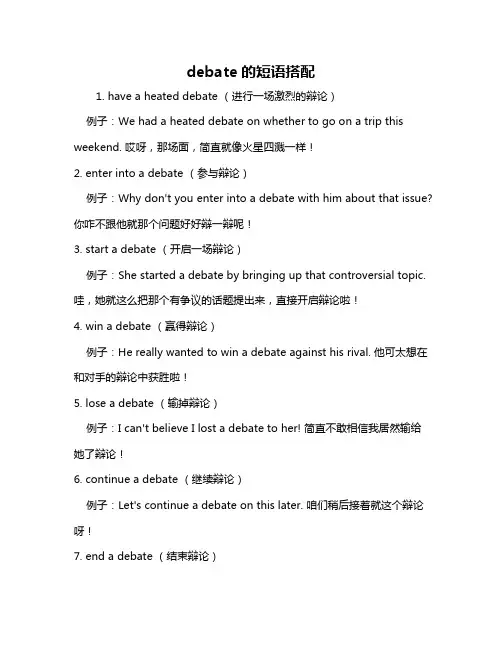
debate的短语搭配1. have a heated debate (进行一场激烈的辩论)例子:We had a heated debate on whether to go on a trip this weekend. 哎呀,那场面,简直就像火星四溅一样!2. enter into a debate (参与辩论)例子:Why don't you enter into a debate with him about that issue? 你咋不跟他就那个问题好好辩一辩呢!3. start a debate (开启一场辩论)例子:She started a debate by bringing up that controversial topic. 哇,她就这么把那个有争议的话题提出来,直接开启辩论啦!4. win a debate (赢得辩论)例子:He really wanted to win a debate against his rival. 他可太想在和对手的辩论中获胜啦!5. lose a debate (输掉辩论)例子:I can't believe I lost a debate to her! 简直不敢相信我居然输给她了辩论!6. continue a debate (继续辩论)例子:Let's continue a debate on this later. 咱们稍后接着就这个辩论呀!7. end a debate (结束辩论)例子:Finally, they decided to end a debate that had gone on for hours. 终于啊,他们决定结束那场已经持续了好几个小时的辩论。
8. avoid a debate (避免辩论)例子:He always tries to avoid a debate with his boss. 他老是试图避免和老板辩论呢!9.引发一场辩论(trigger a debate)例子:That statement triggered a debate among the classmates. 那句话在同学中间引发了一场辩论呀!我的观点结论:Debate 真的是很有趣也很有挑战性呢,可以让我们深入思考问题,还能锻炼口才和思维能力呀!。
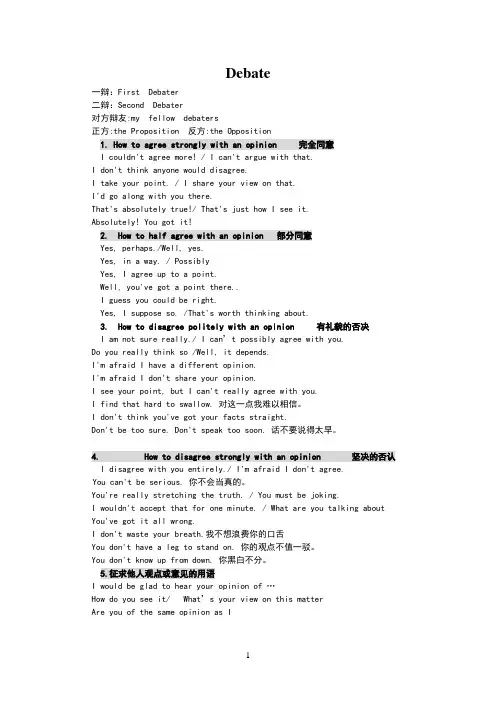
Debate一辩:First Debater二辩:Second Debater对方辩友:my fellow debaters正方:the Proposition 反方:the Opposition1. How to agree strongly with an opinion 完全同意I couldn't agree more! / I can't argue with that.I don't think anyone would disagree.I take your point. / I share your view on that.I'd go along with you there.That's absolutely true!/ That's just how I see it.Absolutely! You got it!2. How to half agree with an opinion 部分同意Yes, perhaps./Well, yes.Yes, in a way. / PossiblyYes, I agree up to a point.Well, you've got a point there..I guess you could be right.Yes, I suppose so. /That's worth thinking about.3. How to disagree politely with an opinion 有礼貌的否决I am not sure really./ I can’t possibly agree with you.Do you really think so /Well, it depends.I'm afraid I have a different opinion.I'm afraid I don't share your opinion.I see your point, but I can't really agree with you.I find that hard to swallow. 对这一点我难以相信。
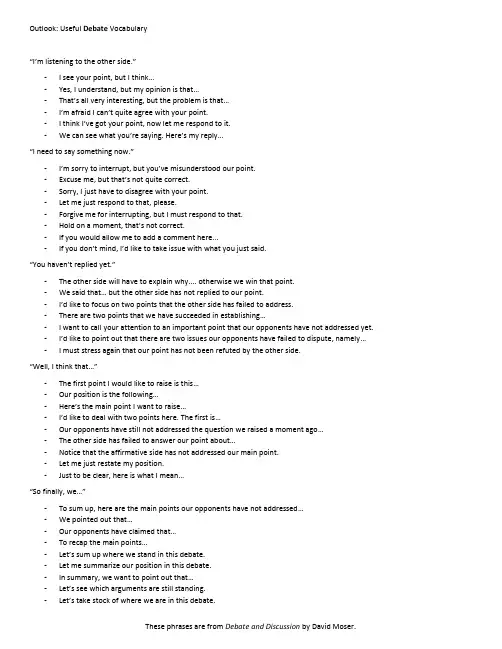
Outlook: Useful Debate Vocabulary“I’m listening to the other side.”-I see your point, but I think…-Yes, I understand, but my opinion is that…-That’s all very interesting, but the problem is that…-I’m afraid I can’t quite agree with your point.-I think I’ve got your point, now let me respond to it.-We can see what you’re saying. Here’s my reply…“I need to say something now.”-I’m sorry to interrupt, but you’ve misunderstood our point.-Excuse me, but that’s not quite correct.-Sorry, I just have to disagree with your point.-Let me just respond to that, please.-Forgive me for interrupting, but I must respond to that.-Hold on a moment, that’s not correct.-If you would allow me to add a comment here...-If you don’t mind, I’d like to take issue with what you just said.“You haven’t replied yet.”-The other side will have to explain why.... otherwise we win that point.-We said that… but the other side has not replied to our point.-I’d like to focus on two points that the other side has failed to address.-There are two points that we have succeeded in establishing…-I want to call your attention to an important point that our opponents have not addressed yet.-I’d like to point out that there are two issues our opponents have failed to dispute, namely…-I must stress again that our point has not been refuted by the other side.“Well, I think that…”-The first point I would like to raise is this…-Our position is the following…-Here’s the main point I want to raise…-I’d like to deal with two points here. The first is…-Our opponents have still not addressed the question we raised a moment ago…-The other side has failed to answer our point about…-Notice that the affirmative side has not addressed our main point.-Let me just restate my position.-Just to be clear, here is what I mean…“So finally, we…”-To sum up, here are the main points our opponents have not addressed…-We pointed out that…-Our opponents have claimed that…-To recap the main points…-Let’s sum up where we stand in this debate.-Let me summarize our position in this debate.-In summary, we want to point out that…-Let’s see which arguments are still standing.-Let’s take stock of where we are in this debate.These phrases are from Debate and Discussion by David Moser.。
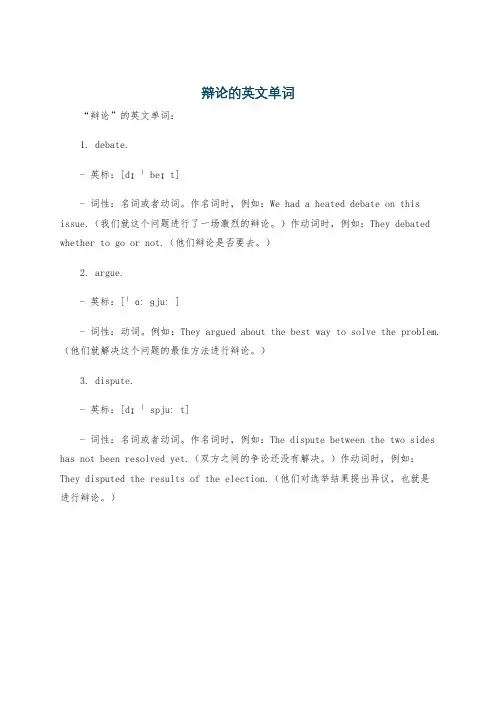
辩论的英文单词
“辩论”的英文单词:
1. debate.
- 英标:[dɪˈbeɪt]
- 词性:名词或者动词。
作名词时,例如:We had a heated debate on this issue.(我们就这个问题进行了一场激烈的辩论。
)作动词时,例如:They debated whether to go or not.(他们辩论是否要去。
)
2. argue.
- 英标:[ˈɑːɡjuː]
- 词性:动词。
例如:They argued about the best way to solve the problem.(他们就解决这个问题的最佳方法进行辩论。
)
3. dispute.
- 英标:[dɪˈspjuːt]
- 词性:名词或者动词。
作名词时,例如:The dispute between the two sides has not been resolved yet.(双方之间的争论还没有解决。
)作动词时,例如:They disputed the results of the election.(他们对选举结果提出异议,也就是进行辩论。
)。
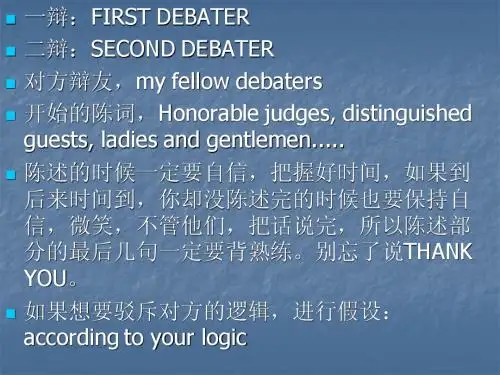

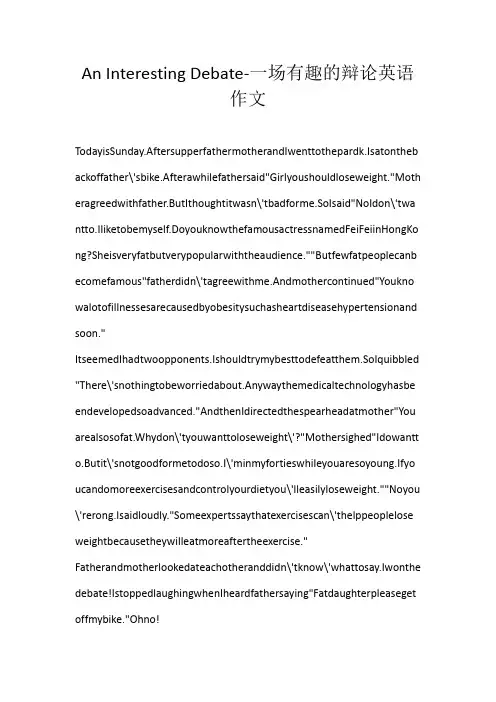
An Interesting Debate-一场有趣的辩论英语作文TodayisSunday.AftersupperfathermotherandIwenttothepardk.Isatontheb ackoffather\'sbike.Afterawhilefathersaid"Girlyoushouldloseweight."Moth eragreedwithfather.ButIthoughtitwasn\'tbadforme.SoIsaid"NoIdon\'twa ntto.Iliketobemyself.DoyouknowthefamousactressnamedFeiFeiinHongKo ng?Sheisveryfatbutverypopularwiththeaudience.""Butfewfatpeoplecanb ecomefamous"fatherdidn\'tagreewithme.Andmothercontinued"Youkno walotofillnessesarecausedbyobesitysuchasheartdiseasehypertensionand soon."ItseemedIhadtwoopponents.Ishouldtrymybesttodefeatthem.SoIquibbled "There\'snothingtobeworriedabout.Anywaythemedicaltechnologyhasbe endevelopedsoadvanced."AndthenIdirectedthespearheadatmother"You arealsosofat.Whydon\'tyouwanttoloseweight\'?"Mothersighed"Idowantt o.Butit\'snotgoodformetodoso.I\'minmyfortieswhileyouaresoyoung.Ifyo ucandomoreexercisesandcontrolyourdietyou\'lleasilyloseweight.""Noyou \'rerong.Isaidloudly."Someexpertssaythatexercisescan\'thelppeoplelose weightbecausetheywilleatmoreaftertheexercise." Fatherandmotherlookedateachotheranddidn\'tknow\'whattosay.Iwonthe debate!IstoppedlaughingwhenIheardfathersaying"Fatdaughterpleaseget offmybike."Ohno!一场有趣的辩论今天是星期天。
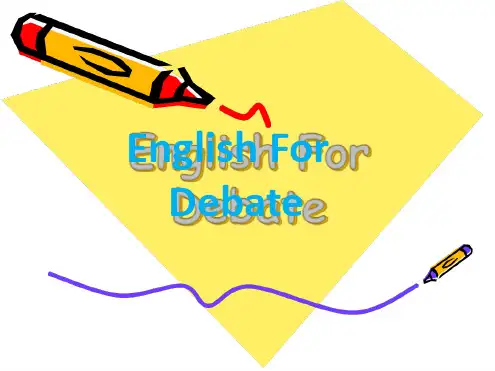
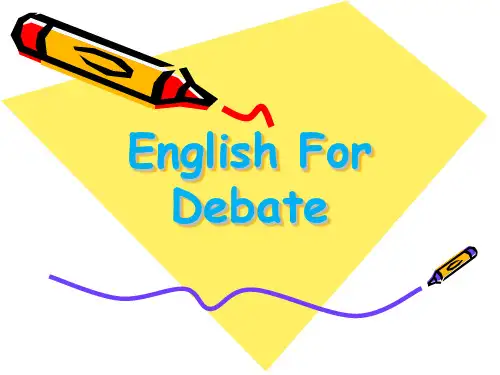
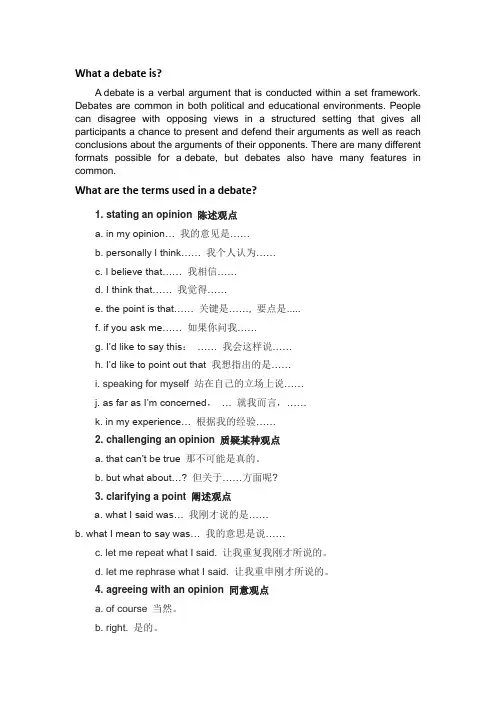
What a debate is?A debate is a verbal argument that is conducted within a set framework. Debates are common in both political and educational environments. People can disagree with opposing views in a structured setting that gives all participants a chance to present and defend their arguments as well as reach conclusions about the arguments of their opponents. There are many different formats possible for a debate, but debates also have many features in common.What are the terms used in a debate?1. stating an opinion 陈述观点a. in my opinion… 我的意见是……b. personally I think…… 我个人认为……c. I believe that…… 我相信……d. I think that…… 我觉得……e. the point is that…… 关键是……, 要点是.....f. if you ask me…… 如果你问我……g. I’d like to say this:…… 我会这样说……h. I’d like to point out that 我想指出的是……i. speaking for myself 站在自己的立场上说……j. as far as I’m concerned,… 就我而言,……k. in my experience… 根据我的经验……2. challenging an opinion 质疑某种观点a. that can’t be true 那不可能是真的。
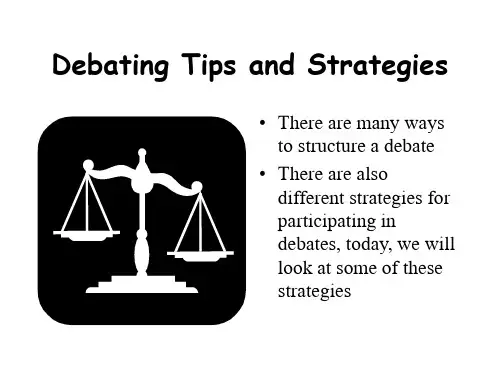
english debate例子
【释义】
english debate
英语辩论
【短语】
1English Debate Society
英文辩论学会
2English Debate Club
英文辩论学会
【例句】
1How to improve your English debate?
如何提高英语演讲辩论水平?
2Mr.Wang:Good morning,Ms.Zhang.I hear you've joined an English debate group.How is it going?
王先生:早上好,张女士。
我听说你参加了英语辩论小组。
怎么样啊?
3Then,when I was in middle school,we came back to Korea and I became interested in English debate.
在我念中学的时候我们全家回到了韩国。
4Without such opportunities,Japanese English learners don't develop vital debate and persuasion skills that are the cornerstone of communication in English.
没有这些机会,日本英语学习者就无法获得很关键的辩论和说服技巧,而这些又是英语交流的基石。
EnglishDebate(英语辩论关于MeToo运动)第一篇:English Debate (英语辩论关于Me Too运动)The Me Too movement is against the fact that sexual harassment continues to take place without punishment, the silence of the victims and the abuse of their reputation.Pursuit of thefeministmovementare:discrimination [dɪ,skrɪmɪ'neʃən]against women, and fight for equal rights for women, women get equal social status with men, as it should be and can choose a career you desire and way of life The standard for judging the benefits of the Me Too exercise is whether it is possible to promote the advancement of women's rights(the rights and respect that women deserve)and The advantages are irreplaceable and the disadvantages can be avoided.The most immediate effect of the Me Too movement is to give the victim the courage to stand up and punish the criminal offender Because born physical reasons, women are more likely than men to suffer the invasion, the statistics[stə'tɪst ɪks] show, more than ninety percent of the invasion is not willing to, or dare not to identify injury oneself person, because they are afraid to say what had happened to her not only won't let bad man be punished and it will increase their own pains.Me Too movement, provides a name for invasion of the platform, because here have the same experience, Mutual ['mjutʃuəl] encouragement makes them feel no longer alone.at the same time because it is a movement in the network by making further information spread faster, generating a wider attention, makingthe real criminal offender should be punished T o form a normal sympathize ['sɪmpə'θaɪz]with the victim of society, namely when happening again night run girls were raped [rept], public opinion is no longer predisposed ['pridɪ'spoz to say the girls wearing an crime but everyone standing in the middle of the scale [skel]to find the truth The Me Too movement will bring about the normal boundaries ['baʊndri]of a clearer gender ['dʒɛnd ɚ]relationship.Because the victim to expose their own suffering experience, this will make other people understand more clearly what your actions will make each other feel uncomfortable or even harmedWhen we know clear boundaries, will not let the son preference of workplace quotation fear of female to get in the way of women accumulate work experience and career advancement.Because when everyone knows that line, there is no accidentally charged of sexual harassment, unless your really motivation not pure Burns's rule is that he and his wife choose to run a marriage, and he can only tell us that understanding of gender should lead people to set boundaries in the process of daily communication.第二篇:文档英语辩论稿Positive side: Internet does more good than harm Negative side: Internet does more harm than good一、陈述观点阶段正方一辩Respected chairman each leader comrades and friends from the opposite side Good morningIn todays information age the Internet is more and more strongly involved in our lives more and more close to everyone of us.We firmly believe that the Internet does more good than harm First of all the Internet is a virtual treasure trove of information.It makes the global sharing of information resources any kind ofinformation on any topic under the sun is available on the Internet.People from all works are storing maintaining and updating the information in internet every day.We can almost find any type of data on almost any kind of subject that we are looking for.Secondly the Internet brings great convenience to our lives.Many services are now provided on the internet such as online banking job seeking purchasing tickets for your favorite movies guidance services on array of topics engulfing the every aspect of life and hotel reservations.Often these services are not available off-line and can cost you more.Thirdly the Internet has greatly improved work efficiency.Not only education and learning but also trade conference can be conducted online.The companies in different areas can hold online meetings through the internet to bargain important issues of business.Internet cuts out a series of complex processes saves a lot of manpower and material resources and improves our work efficiency greatly.Finally the internet can open our minds.Today we are in an information society internet is an encyclopedic world with extremely rich information.We can timely understand current events access to the latest knowledge and information through the internet.Just like an old saying: Xiucai knows everything under the Heaven though he needn’t to leave his home.Therefore we firmly believe that the internet does more good than harm Thank you 反方一辩Internet plays a very important role in modern life.It has revolutionized our lives in many ways as the affirmative side described.However it is the innovative change of the Int ernet era that Pandora’s box is opened at the same time.a virtual world Internet provides in which persons surfing on the Internet don’t know each other they just identify others’ identification through online loginaccount so that it is lack of basic trust relationship because all you know is only his/her e-mail or QQ number and you should not blindly believe in the Internet.While more and more people lose themselves in online games which is not only waste of money but also waste of time.some feel lost without the internet like a man without a soul a slave to the internet.others even have an addiction problem to the internet to the extent of medical treatment.In addition long-term online all day to autism and indulge in fantasy from reality leads to the state when they really face society and the crowd because of distance and imagine the problems are not normal shrinking communicating with people Moreover parents nowadays have been worried about what their kids read and see on-line because of pornography or violent scene being full of Internet and these teenage will go out in real life and function.Consequently Internet is gradually eroded their physical and mental health.Even worse some bad gangs make use of the Internet to steal others’ privacy information damage and control other people’s computer system to launch malicious attack suck as DoS Trojan horse and so on.All of the above statements prove that Internet has done more harm than good to society.二、自由辩论阶段正方1Our viewpoint is “Internet does more advantages than harm”.The spreading speed of traditional books newspapers and magazines is so slow.With the developing of the Internet people can get plenty of information from the networks quickly and conveniently and they feel the world become much smaller.For example we knew the exact news from Internet about the earthquake in WenChuan several minutes after its happening.And the popular word “earth village” can support our opinion too.反方1Excuse me I can’t agree with you.I think Internet do more harm thangood.Although we can get information quickly on Internet.But it also brings new problems.For example many Publishing Company went bankrupt and Many people lost their jobs.At the same time the copyright status is very bad in China.There is a joke: a young man to Microsoft interview he answer the interviewer a question and he was driven out.because the interviewer asked him Do you know the price of Microsoft operate system in China The young man asked: 5 yuan.Is this good to you 正方2Although the Internet makes some industries closed down but it has also produced some new industries.The defenders only see the Internet makes some people lose jobs but do not see the Internet gives more people new jobs so the defenders point of view is one-sided.With the development of Internet the communication between people is more easily we can communicate with others through a lot of ways provided by the Internet such as QQ EMAIL chat room and so on.反方2Please note you confuse a basic concept the distance between people is to rely on people themselves to decide ever not the network.The network is changing people s way of communication.In the absence of the Internet era we still can narrow the distance between people therefore it cannot be said that the Internet has shortened the distance between people.On the contrary people put too much effort and emotion in the Internet reduced face-to-face communication with the family friends colleagues so that the distance between two hearts increased it makes people become distant.正方3In addition to the front view of our partners I think the Internet has created a new way of life.Chat online checking information online learning online or even work online people can complete many things remain indoors which is impossible previously.SOHO is now avery popular word it means Small Office and Home Office.This makes it reality for people to choose the way of life and work according to their own interest and hobbies without limitation of time and place.反方3I’m sorry I don’t agree with you.I feel the Internet can help us to do many thing at the same time people become more and more lazy more and more weaker even lost the joy of living.Please look me my weight is 130 pounds 2 years ago now I spend much time on Internet so I am overweight and become weak.正方4Mr.Yan I have to say your point of view is very creative But I think the weight problems are not necessarily lined with the popularity of the network One of the biggest benefits of the Internet is accelerating the flow of information and spreading education to all corners of the globe.Now there are a lot of searching engines on the Internet such as Google and Baidu we can get whatever information we want within only several seconds.Just like an old saying: Xiucai knows everything under the Heaven though he needs not to leave his home.反方4The other debater please note you only see the benefits of the Internet and ignored the existence of a large number of bad information on the Internet the information has a very bad influence on people especially teenagers and even cause them to crime.According to statistics more than 80 of the minor crime is related to exposure of bad information in the network some minor to indulge in violence pornographic games the game scenes to life by the game of seduction and lead to crime.正方5I must remind the other side debaters.It is because of the high speed developing of networks that the adults pay more attention to the young criminals quickly and adopt efficient measures.Is it not the advantage of the Internet Let’s think about the invention and using of knife it has an analogy to the Internet.反方5Excuse me I oppose you change the focus.I think There is a More severe problem.Please note the remarks of Anti-social and Pseudo-science on Internet.not only young man but also adults are affected.It is very dangerous to all and to our country.Do you can talk the advantage of Internet standing here 正方6When we were young parents and teacher often told us: Pick up the good and throw away the bad.But now you are not only staring at the bad but also exaggerating it It’s wrong Very wrong I would also say Internet is just like a bridge of communicating between people.It’s a great way to meet up with people of similar interest and discuss common issues saving both money and time.反方6Please note we have already explained this will only increase the distance between people.In the real world interpersonal relations become weak.After all the Internet is only a small part of human life people are to be living in the real world the weak relationships people feel more and more lonely because friends only exist on the Internet in real life there is no real friends.正方7This is just a social problem not the wrong of Internet itself.So we dont need to discuss it.I want to describe another big advantage of the Internet.It is that the Internet makes the electronic commerce vigorous developed.Now more and more shops run online and more and more people like online shopping it brings great convenience to us.For example Ive just bought a pair of leather shoes from the Internet last week it is 30 cheaper than the same products in entity stores besides it also saves a large amount of shopping time for me.反方7The Internet is convenient But please note the Internet is unsafe.hacker computer virus Trojan network fishing and so on It will make the Internet become very terrible.we may have cheated lost money even lost privacy.A newspaper report: A company with millions of assets wentbackrupt because a young man used the leak of the network.And I believe you remember the movie star CHEN Guan Xi his personal photos were for all to see.The Internet is too unsafe.正方8Although there are secure problems on Internet but we can adopt many technique methods to solve them.Another benefit the Internet brings is entertainment.You can find many ways to amuse yourself.Watching online movies playing online games and talking in chat room can help you relax.Furthermore you can make friends with many fun and kind people all over the world.反方8Yes now the entertainment network is very developed leads to more problems.More and more young people indulging in online entertainment the network has great dependence even morbid.The Internet makes young people confuse the virtual world and the real world influences the young people moral standard of judgment.At the same time the network game had a bad influence to young peoples mental health learning life make them fat decreased performance decreased visual acuity even cant write with a pen.正方9Please pay attention once again what you talked about is not the wrong of Internet itself it is the problem of its users.And it is just the development of online entertainment that have enriched our life and made large contribution to the state GDP.反方9I’m sorry I also please you note.The violent and pornographic scene are often appear in the online games.It constantly hurt the soul of young people make them become depressed.We all know The young people are enthusiastic Dynamic and Positive they are main power of develop of country.thus It is not only the problem of family but al so the problem of the society.So let’s far away from the Internet and make the children become well make the society become civilized.正方10I found a very interestingphenomenon.We have list many benefits internet bring to us but you refute all of these through the problems of people not the problems of internet itself.So we still firmly hold that the benefits of the internet are much greater than the negative impacts.反方10Excuse me you ignore the harm of the Internet.It is very dangerous三、总结陈词阶段反方四辩 Generally speaking the internet isa double-edged sword.Like a coin have two side the good side and the bad side yes it really improvement our life in some aspect but isn’t all.The internet brought a lot of bother with negative thing.And we don’t have the method for solve.Such as the network deceive divulge privacy too much bad information and so on.and the most important We can’t be 100 to eliminate those problems at least not yet.So the internet is not Perfect world We should not expect too much on the Internet.As we all know the birth of the Internet causes not used to enrich peoples lives but to service the military field so I think it is very suitable for the application in the military enterprises companies departments and other areas like that.Although it can be applied to the daily life of ordinary people it still has limitations.As the nuclear weapon action is huge but people must find a way to control it or just opened a Pandoras box the devil will be released.So the most important is how we using the Internet in our life rather than the Internet itself.if we know what we need clearly and how to take advantage of internet responsibly.I am sure it will affect our modern life in a positive way and make our life more wonderful and splendid.正方四辩 Ladies and Gentlemen Good morning We are so happy and lucky for we live inthe information age with rapidly developed technology.And the Internet is a sign of the times.We are sure that the Internet mustdo more good than harm First of all the Internethas brought us great benefits.As our partners have said the Internet can accelerate the information query narrow the world and make the communication of people more convenient.Despite of shopping online learning onlineand message delivery even the debate today we’ve collected a lot of information on Internet.The Internethas opened for us a convenient way enriched our life andacceleratedthe progress of our society.Secondly everything has two sides so does the Internet.As the defenders stated The Internet has some drawbacks while it brings us convenience.But the harm of Internet strictly speaking is the wrong of people.Some people usethe benefits of Internet to commit a crime spread the bad information while other people use the net unhealthily indulging in Internet game wasting too much time in Internet.But all of these are not wrong for Internet itself but for the people who use it.And It is just like a knife initially created in order to solve some problems in life but someone use it to murder while the knife is not wrong in itself.Thirdly the good of Internet must be more thanitsharm.If not perhaps the Internet has died out in its development.If Internet does more harm than goodit must be disgusted by people.Could the number of people in our country using Internet will be more than one hundred million If Internetcan do more harm than good sosmart as the United States will it vote heavily in the construction of theInternet Finally the harm of the Internetcan be completely avoided.As long as we strengthen the network protection many security problems can be avoidedand if dont loss prevention and alert for some small profits in the Internetwe can reducethe chance of being deceived.At the same time we have to control the time of being online to keep health the relevant departments should alsostrengthen the management of the Internet control the spreading of harmful information so that the Internetruns in a healthy environment.As Lu Xun had said when the windows openIn not only the fresh air but also the flies and mosquitoes.Lets expand the good of Internet reduce its harm and make the Internet be our good teacher and friend Thank you第三篇:英语辩论稿一辩陈词自由辩:二辩:纸质书比电子书更有利于身体健康.There is no doubt about the rapid development of the e-book , but we don’t think that paper-books will be replaced by e-books.Nowadays, people are paying more and more attention to health issues.It is important to realize that e-books are easy to cause damage of our eyes and vision loss;And there are other health risks using e-books.When we read e-books rather than paper-books for a long time, paper-books are more healthier to the readers.反方二辩:看纸质书看久了也会对视力不好It is important to realize that paper-books are also easy to cause damage of our eyes and vision loss when we read for a long time.For example, Sushi(苏轼)is also a myopia man.一辩:纸质书给作者的版权保护更完整,更能保证收入,而且纸质书拥有的是所有权而电子书只是使用权Another problem is the copyright.Despite the current paper-book rampant piracy problem, it can protect the benefits of the author’s better than e-books.E-books raises the popularity of piracy.Although people may need to pay for their downloading some e-books, but in more cases ,the user only need click his mouse.And the writer usually get less payment for their books.The press often choose to publish real books and just provide a part of the book on the internet, thus we can be sure that paper-books give the press and their writers much morereturn than e-books.反方三辩:现在的盗版书猖獗,一样没有版权提问:电子书携带方便,传播方便,纸质书就做不到。